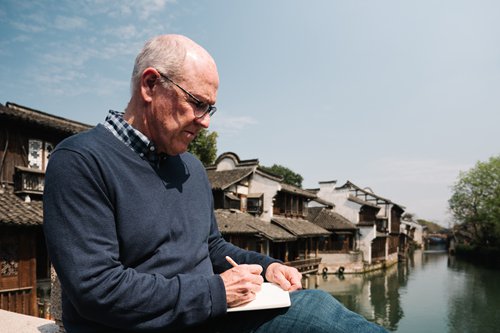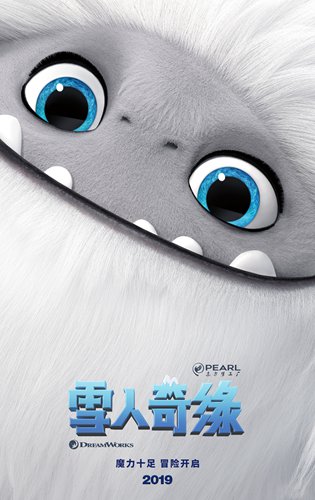ARTS / FILM
China’s Pearl Studio aims to make domestic animation a global player
Looking to the future

Glen Keane Photo: Courtesy of Pearl Studio

Movie poster for Abominable Photo: Courtesy of Pearl Studio
From a giant cute Yeti to the legendary Monkey King, Chinese animation company Pearl Studio just announced its slate of upcoming works for the next few years.
"We just want to tell the market: Pearl Studio is back," said Li Ruigang, chairman of CMC Capital Partners, which has full ownership of the Shanghai-based studio formerly known as Oriental DreamWorks on Monday.
"And we are full of confidence for the future."
According to Li, this September will see the studio's long-anticipated yeti film Abominable hit theaters, followed by Over the Moon from legendary Academy Award winner Glen Keane in 2020 and The Monkey King, an animated version of the Monkey King story, from famed Hong Kong director and actor Stephen Chow in 2021.
Setting sights high
The announcement marks the studio's first official press event since CMC took full ownership of Oriental DreamWorks, a joint venture between CMC and US animation studio DreamWorks, and rebranded it as Pearl Studio in 2018.
"Its [NBCUniversal, the parent company of DreamWorks Animation] Chinese strategy was their Universal Studios in Beijing, not making animated films in China," said Li recalling the company's "peaceful breakup" with Universal.
"But we still want to produce animated films. With that, we aim to become the only Chinese company that can export animated works to the global market."
With North America and China becoming the dual engines pushing the growth of the global film market, China's live action movies have developed rapidly, but the same cannot be said about its animated films.
"We are still far behind US movies. The good news is that we have discovered that opportunities lie in recent trends toward non-European cultures like Coco, which was inspired by Mexican culture, and of course Kung Fu Panda from China," Li said.
However, Chinese animated movies still contribute a small amount of revenue to the overall box office in China, the world's second-largest market.
"Compared with the US's 15 to 20 percent, China's animation industry has been in the low single digits in quite a long time. In 2018, that number rose close to 10 percent. Looking at the US's animation industry as a reference, China's animated movies will grow fast and steadily over the next five years into a big market of more than 10 billion yuan (1.48 billion)," predicted Frank Zhu, CEO of Pearl Studio.
As a studio that aims to be competitive in the global market, Pearl Studio will have to face strong competition from overseas studios like Disney, Illumination and of course DreamWorks.
"We notice some trends in the global market that Netflix is deeply changing Hollywood. We are seeing that change and that is the reason why we started to work with Netflix for our second project Over the Moon, right after the first one with Universal," Zhu told the Global Times on Monday.
"The changes brought by streaming platforms like Amazon, Netflix and Apple are our chances to enter the market with the added capital from them. According to reports, Netflix spends a total of $1.1 billion on animated content," he noted.
Zhu also mentioned that the Chinese market and Chinese content are also a new trend in Hollywood.
"Coproduction The Meg and Crazy Rich Asians were a great success in the US. We have advantages in terms of storytelling and Hollywood distribution partners," he added.
Exploring 'Chinese elements'
While more and more film studios are turning their eyes to China, not all "Chinese elements" have been well-accepted by the market.
"What does 'Chinese elements' mean? There are very broad interpretations," Peilin Chou, Chief Creative Officer for Pearl Studio, told the Global Times.
"It does not always have to be a Chinese character, or having the film set in China. There are Chinese themes like family, for example, that is very important."
Chou and her team have been working to "find other ways that we can explore Chinese elements," the key of which lies in "reflecting the world as it really is" and showing "diversity."
According to Chou, the upcoming production Over the Moon is one of such example of telling a Chinese inspired story in a way that Western audiences can accept. Taking place in China, the story follows a young Chinese girl who hopes to prevent her father from remarrying by building a rocket to the moon. Inspired by the romantic story of Chang'e, the moon goddess, and her love for Houyi, the young girl hopes the goddess can help her resolve her dilemma. Although the film has a happy ending, the story does not unfold using typical traditional Chinese storytelling.
Before the project was given the green light, it had to go through seven steps that included hiring a Hollywood writer, developing an outline and a script and then finding a director. While the director of the film is not from China, much work for the film is being completed by Chinese. The studio also holds annual meetings so writers can get inspiration from Hollywood and the Chinese film industry and also invites artists to complete residencies at the studio so they can bring in fresh ideas.
All in all it can take years for a simple idea to make it to cinemas in animated form.

